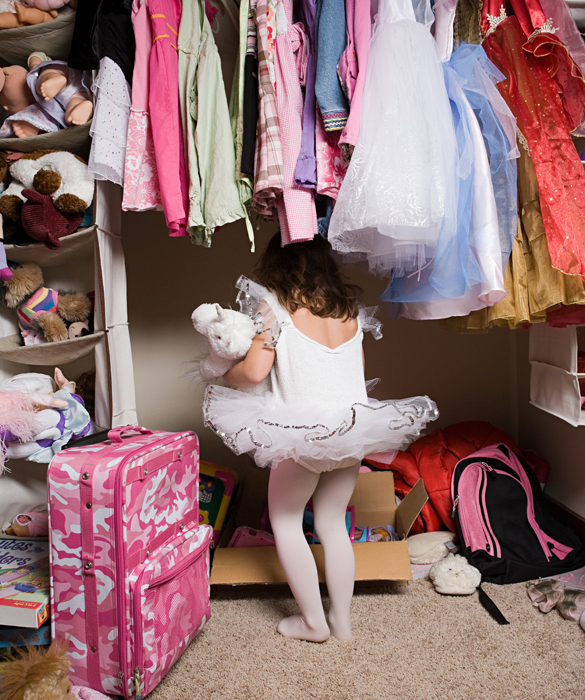Girls Are Dieting by Age 10

Is age 10 a magic turning point for girls as they struggle with body image? Perhaps. The Guardian reports that by age 10, a third of all girls list the way their bodies look as their top concern in life. What’s more? According to PBS, the Keep It Real campaign recently conducted research and found out more than 80 percent of girls had tried dieting at least once by age 10.
'Thigh gaps' have become teen status symbols

Heard about the “thigh gap"? Ask your teenage daughter, because she likely has. ABC News recently reported on an alarming trend among high school girls, perpetuated by model physiques and Internet images. When standing up straight with feet together and knees touching, teens want to see gaps between their thighs, even if they know it takes poor nutrition habits and overexercising to get there. When asked what the deal was, the panel of young women admitted it was a status symbol among them—proof that skinny frames are becoming more important than the latest jeans or newest tech gadget.
Board Games Becoming More Image-Conscious

Candy Land seems like a clean and family-friendly toy choice for young kids, right? Not so fast—even little boys and girls ages 3 to 5 can’t escape the ideal body type madness. The Atlantic analyzed just how the board game has changed since its debut in the late 1940s, and after taking stock of the new look, an alarming trend had emerged: female characters like Princess Lolly and Queen Frostine had undergone a “hot makeover,” complete with smaller waistlines, fuller lips and bigger, brighter eyes. Was that really necessary?
Body-Image Issues in Boys Could Lead to Steroids

Most of the time, society views body image as a girls-only problem, but boys experience the pressures of not living up to the ideal, as well. The Daily Herald reported on a recent Pediatrics journal study where the authors maintain boys are now “obsessing over unobtainable bodies” and are keen on bulking up, a phenomenon known as “bigorexia.” However, poor body image and too much time in the gym lifting weights before their bodies are fully developed can lead to problems down the road, like steroid use and possible musculoskeletal problems.
MORE: Boys and Body Image
Teens Find 'Thinspiration' on Social Media

Kids spend a lot of time on social media like Tumblr, Pinterest and Twitter, but clicking around may cause more harm than good. Social media is more than a source for yummy recipes, wish-list items and updates from friends, as teens are using these outlets for “thinspiration.” According to clinical psychologist Andrea Vazzana from New York University's Child Study Center, teen girls can now get motivation for emaciation from thinspirational content rampant on the web. "Social media has become a covert way to share different tricks and tips for managing hunger, restricting calories, self-induced vomiting and ways to hide weight loss," she told ABC News. What’s more? A recent study from the International Journal of Eating Disorders reported 96 percent of women checking out thinspirational content found new ways to keep weight in check.
More Kids Under 12 Hospitalized for Eating Disorders

Although it’s not entirely clear why eating disorders are more and more prevalent—perhaps an emphasis on pin-thin frames and an increased ability for kids to access airbrushed images—what is clear is they are on the rise in kids under age 12, says PBS. Hospitalizations for EDs have more than doubled in the past decade among this age group, according to research from Agency for Healthcare Research and Quality.
Concept of 'Fat Prejudice' Starts as Young as 4

According to a new study from the University of Leeds, young children are equating being overweight with having a negative quality of life. When reading different versions of a story centered on a character named Alfie who was overweight or normal weight, only one out of 43 kids ages 4 to 7 said they would make friends with overweight Alfie. They also said overweight Alfie was more likely to be dissatisfied with his looks, ostracized from parties, and do poorly in school and sports than normal-weight Alfie. "This research confirms young children’s awareness of the huge societal interest in body size," said study author Andrew Hill, according to the Huffington Post.
MORE: Girls and Body Image
Schools May Perpetuate Bad Eating Habits

An emphasis on health and fitness in schools has made kids more aware of their bodies—but for better, or for worse? The Globe and Mail recently reported about a 14-year-old boy, whose school’s healthy living initiative spawned an obsession with nutrition and fitness; 7 months after setting a goal to get in shape, he was diagnosed with an eating disorder and went down to 95 pounds. Parents are also growing concerned over schools screening for Body Mass Index (BMI) because of its impact on young kids’ body images. "'How much do you weigh?' became the question of the month among fourth-grade girls," one mom said about her child’s school, according to the Chicago Tribune. "My daughter has cried many nights worrying about her weight since this experience."
Clothes Becoming More Sexualized

Gwyneth Paltrow recently took heat for featuring bikinis aimed at 4- to 8-year-olds in her popular GOOP newsletter, but the trend is more prevalent than many realize. According to the New York Times, a 2011 study analyzed more than 5,000 girls’ clothing items on 15 popular websites and found that nearly 30 percent had “sexualizing characteristics,” including more than half of dresses and two-thirds of swimwear.
Anxiety May Trigger an Eating Disorder

If your child is a worrywart by nature—stressing about the big game, her social standing and her test scores—you may want to keep a watchful eye out for eating disorders. According to Everyday Health, anxiety can be an ED trigger. Sometimes the development of a condition has nothing to do with food and everything to do with control. "Two out of three people with eating disorders also had an anxiety disorder at some point in their life," says Louisville-based therapist Sally R. Connolly. Generally, this starts in childhood.




